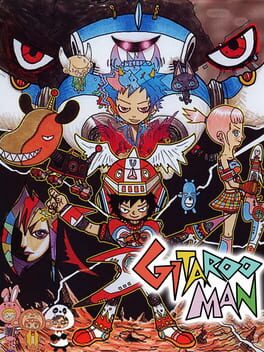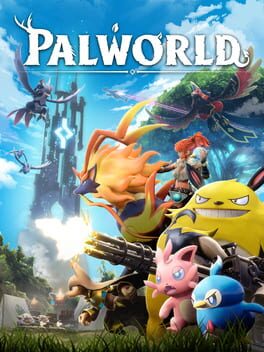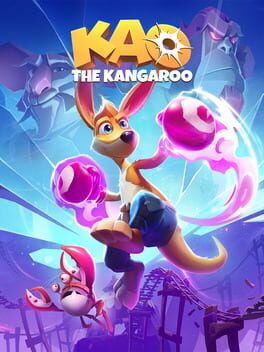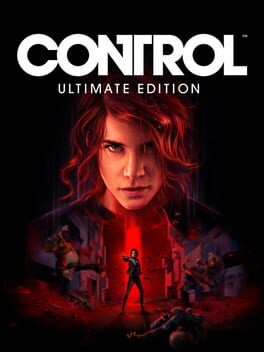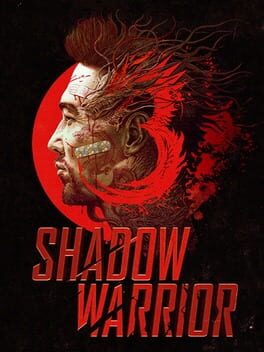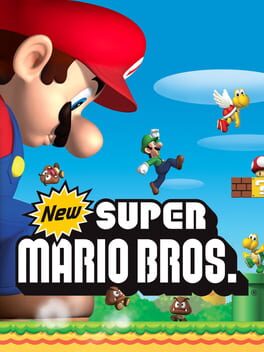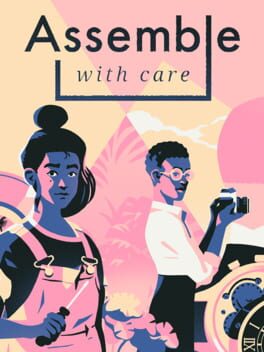Rexarma
50 reviews liked by Rexarma
Gitaroo Man
2001
I don't get it.
Gitaroo Man is okay. Those are the strongest feelings I can muster towards it.
I'm left grasping at what people actually like so much about this for it to have the reputation that it does. I've heard a lot about the story, and the gameplay, and the music, and I'm wondering what it is here that connected with others and didn't with me. It's as if we've all played different games. What I've seen isn't worth much celebration, but that hasn't stopped the party from raging on without me involved. I'm lost. What is it about Gitaroo Man that I've missed?
The gameplay is finicky. Timing windows feel just a little out of sync no matter how much I fiddle with the delay. The Dualshock 2 analog stick was not designed for the precise movements that the game implies you're meant to be doing. Every whammy bar sequence where the line wobbles actually fails if you try to wobble along with it; you just keep holding the stick down through the middle of the the line, and the game automatically compensates and wiggles it for you. The Charge/Attack/Final sequences are an interesting touch, but all they are in effect is the ability to prematurely end a song if you play it well enough. It's still an engaging and difficult enough loop to justify playing through all ten stages, but it's not something that impressed me.
I feel as though any piece of Japanese media with a child character in it will immediately have a legion of fans who give it acclaim as "a story about growing up", even if that doesn't apply in the slightest. I don't mean to vaguepost about any reviewers here — Lord knows I probably am anyway, but I've very purposefully avoided reading anyone else's words on Backloggd about this — but everything I've seen elsewhere online is full of people who can't stop insisting that it's about maturity, or the joy of being a child, or whatever. I don't see it. A loser kid gets powers and goes on an adventure where he comes back a little cooler. You couldn't have a more basic Saturday morning framework if you tried, and this one is as simplistic and boring as a wall painted beige. Gitaroo Man gets unduly hailed as one of the most moving stories in video games solely for the reason that there are two good songs planted right at the end of it.
The soundtrack is...fine, mostly? The Legendary Theme fucking rocks, as does Resurrection, but there are some pulls on here that are just mediocre. Twisted Reality, Born to be Bone, and VOID are the especially goofy-sounding songs. Flyin' to Your Heart has the double dishonor of being the worst track here and being the longest by three entire minutes. If we're being honest, the last two songs in the game are good enough to justify the existence of the entire soundtrack, but they're pulling a lot of weight.
And that's it. There isn't anything left to talk about, and there isn't anything here that I've loved. I don't know. I get the distinct feeling of being stupid. Of missing out. But I really just don't see what everyone else sees in Gitaroo Man. I'm disappointed, but it's probably my own fault. Maybe I just had unrealistic expectations. Everyone else got a pleasant surprise, and I created an unattainable standard in the wake of its reception.
I wish I'd gotten the same experience as everyone who loved this.
Gitaroo Man is okay. Those are the strongest feelings I can muster towards it.
I'm left grasping at what people actually like so much about this for it to have the reputation that it does. I've heard a lot about the story, and the gameplay, and the music, and I'm wondering what it is here that connected with others and didn't with me. It's as if we've all played different games. What I've seen isn't worth much celebration, but that hasn't stopped the party from raging on without me involved. I'm lost. What is it about Gitaroo Man that I've missed?
The gameplay is finicky. Timing windows feel just a little out of sync no matter how much I fiddle with the delay. The Dualshock 2 analog stick was not designed for the precise movements that the game implies you're meant to be doing. Every whammy bar sequence where the line wobbles actually fails if you try to wobble along with it; you just keep holding the stick down through the middle of the the line, and the game automatically compensates and wiggles it for you. The Charge/Attack/Final sequences are an interesting touch, but all they are in effect is the ability to prematurely end a song if you play it well enough. It's still an engaging and difficult enough loop to justify playing through all ten stages, but it's not something that impressed me.
I feel as though any piece of Japanese media with a child character in it will immediately have a legion of fans who give it acclaim as "a story about growing up", even if that doesn't apply in the slightest. I don't mean to vaguepost about any reviewers here — Lord knows I probably am anyway, but I've very purposefully avoided reading anyone else's words on Backloggd about this — but everything I've seen elsewhere online is full of people who can't stop insisting that it's about maturity, or the joy of being a child, or whatever. I don't see it. A loser kid gets powers and goes on an adventure where he comes back a little cooler. You couldn't have a more basic Saturday morning framework if you tried, and this one is as simplistic and boring as a wall painted beige. Gitaroo Man gets unduly hailed as one of the most moving stories in video games solely for the reason that there are two good songs planted right at the end of it.
The soundtrack is...fine, mostly? The Legendary Theme fucking rocks, as does Resurrection, but there are some pulls on here that are just mediocre. Twisted Reality, Born to be Bone, and VOID are the especially goofy-sounding songs. Flyin' to Your Heart has the double dishonor of being the worst track here and being the longest by three entire minutes. If we're being honest, the last two songs in the game are good enough to justify the existence of the entire soundtrack, but they're pulling a lot of weight.
And that's it. There isn't anything left to talk about, and there isn't anything here that I've loved. I don't know. I get the distinct feeling of being stupid. Of missing out. But I really just don't see what everyone else sees in Gitaroo Man. I'm disappointed, but it's probably my own fault. Maybe I just had unrealistic expectations. Everyone else got a pleasant surprise, and I created an unattainable standard in the wake of its reception.
I wish I'd gotten the same experience as everyone who loved this.
Palworld
2024
Mir ist es ehrlichgesagt vollkommen schleierhaft, wie um dieses Spiele ein dermaßen großer Hype entstehen konnte und, trotz vieler Kritik und Vorwürfe, es überwiegend positiv ankommt.
Falls der KI Vorwurf stimmt, wäre das wirklich sehr ekelhaft und sollte nicht mit so einem großen Erfolg belohnt werden.
Die Tatsache, dass es aber vielen Leuten im Grunde egal ist was sie konsumieren und quasi sagen, dass es ihnen einfach nur Spaß machen muss um jegliche Kontroverse oder Kritik daran zu ignorieren, lässt mich immer wieder aufs neue erstaunen und setzt ein ganz böses Zeichen für die Industrie.
Und wenn man sich mal das Studio Pocket Pair genauer anschaut, sucht man vergebens nach Kreativität und Originalität.
Abseits dieser Kontroverse, ist das Spiel ein einfallsloses, langweiliges Survival-Spiel, wie man es schon tausend mal gesehen hat. Die Open-World ist genauso generisch wie der Rest auch und bietet dazu noch einen typischen Unreal Engine 5 Look, der im Kontrast zum Design der Charaktere und Pals sehr unstimmig wirkt.
Wie viel liebe hier reingeflossen ist, merkt man spätestens wenn man sich die emotionslosen Charaktere mit ihren schlampigen Animationen anschaut.
Aber wer schon immer auf Pokemon schießen wollte, wird wohl den spaß seines Lebens haben.
Falls der KI Vorwurf stimmt, wäre das wirklich sehr ekelhaft und sollte nicht mit so einem großen Erfolg belohnt werden.
Die Tatsache, dass es aber vielen Leuten im Grunde egal ist was sie konsumieren und quasi sagen, dass es ihnen einfach nur Spaß machen muss um jegliche Kontroverse oder Kritik daran zu ignorieren, lässt mich immer wieder aufs neue erstaunen und setzt ein ganz böses Zeichen für die Industrie.
Und wenn man sich mal das Studio Pocket Pair genauer anschaut, sucht man vergebens nach Kreativität und Originalität.
Abseits dieser Kontroverse, ist das Spiel ein einfallsloses, langweiliges Survival-Spiel, wie man es schon tausend mal gesehen hat. Die Open-World ist genauso generisch wie der Rest auch und bietet dazu noch einen typischen Unreal Engine 5 Look, der im Kontrast zum Design der Charaktere und Pals sehr unstimmig wirkt.
Wie viel liebe hier reingeflossen ist, merkt man spätestens wenn man sich die emotionslosen Charaktere mit ihren schlampigen Animationen anschaut.
Aber wer schon immer auf Pokemon schießen wollte, wird wohl den spaß seines Lebens haben.
Palworld
2024
This is the gaming equavilent to a pig trouph. A bunch of leftovers and scraps from better, more successful games mindlessly mashed into a bin and fed to gamers who'll gobble up any AI generated, plagarised piece of slop as long as they're "sticking it to Game Freak". I promise you, Game Freak doesn't care about this game now and they especially won't care about it in a month when the hype has died down and it dissapears off the face of the internet. As an aspiring game designer, who starts study this year it's incredibly disheartening to see such a low effort game get so popular and be met with so much success. What's the point in even trying if this passionless and creatively bankrupt game is all it takes for great success. Go support indie devs that actually put passion and effort into their games, go play Nexomon, or Monster Sanctuary, or Monster Crown, or Coromon, or Cassette Beasts, or any of the other hundreds of indie games that actually deserve your money.
Kao the Kangaroo
2022
I'm not sure what was worse, the acting or the lack of anything interesting in the game. There was one interesting level, the ice slopes one, but that was just because it was something different. The game has no interesting movement options and no way to have any fun, as invisible walls will block off any thoughts of creativity.
The characters are really flat too. You could do a lot with a platformer starring a Kangaroo with boxing gloves, and they chose to do practically nothing. He just spouts the most unfunny dialogue or empty eye rolling pop culture references. in this awful voice that I can only describe as "teenage boy struggling with his identity and a cold at the same time". The villain, who comes off as an unfortunate stereotype in his own way (I didn't even know he was supposed to be a monkey until I looked it up he looked like something else), is empty too and only gets a motive in the last 5 seconds. There's this idea where all the fighting schools are turned into other businesses, but nowhere do I see why that's a bad thing.
The collectables are also rather pointless, as you will get literally all of the Runes just by playing through the linear levels, the scrolls give you lore, and none of the other collectables like diamonds or KAO do anything and seem to just be there for the sake of having more collectables. It's also rather unpolished, with no proper transitions, loud sound effects in cutscenes, lots of missing sound effects in boss fights, hell I even took a walk below the death plane once. Oh, and I got a crash on the 3rd Boss fight. Can't forget that.
All in all, I haven't played the game that this is a sequel/reboot of, but if this is any indicator then perhaps it should have stayed in the past.
The characters are really flat too. You could do a lot with a platformer starring a Kangaroo with boxing gloves, and they chose to do practically nothing. He just spouts the most unfunny dialogue or empty eye rolling pop culture references. in this awful voice that I can only describe as "teenage boy struggling with his identity and a cold at the same time". The villain, who comes off as an unfortunate stereotype in his own way (I didn't even know he was supposed to be a monkey until I looked it up he looked like something else), is empty too and only gets a motive in the last 5 seconds. There's this idea where all the fighting schools are turned into other businesses, but nowhere do I see why that's a bad thing.
The collectables are also rather pointless, as you will get literally all of the Runes just by playing through the linear levels, the scrolls give you lore, and none of the other collectables like diamonds or KAO do anything and seem to just be there for the sake of having more collectables. It's also rather unpolished, with no proper transitions, loud sound effects in cutscenes, lots of missing sound effects in boss fights, hell I even took a walk below the death plane once. Oh, and I got a crash on the 3rd Boss fight. Can't forget that.
All in all, I haven't played the game that this is a sequel/reboot of, but if this is any indicator then perhaps it should have stayed in the past.
Doing a replay of this through the Ultimate Edition to catch up before Alan Wake 2. What an absolutely fantastic time.
Control takes all the elements that detract from Alan Wake and improve on them greatly. Combat is frenetic and tactile and gives you good options for creativity. The story is told in bits and pieces, but much more cleverly and fully engaging than its predecessor. The switch from a half-baked Stephen King novel to SCP story gives so much great perspective on the supernatural elements and engages the player with little mysteries and stories the whole way. Remedy's technical prowess shines as the whole game is just gorgeous, especially with some of the coolest particle effects in gaming.
Won't go into details on the story, but nearly everything sticks. The cast of characters are great, and Jesse is a very good protagonist. I'll be moving on to the two DLCs, Foundation and AWE (Alan Wake) as prep as well.
Highly recommend checking this out. Engaging gameplay, a great and imaginative setting for a third person shooter, wonderful to look at, and paced quite nicely. Moments like the ashtray maze and the dynamite video really add to the unique quality of the experience. So happy that Remedy kept improving over the years.
Control takes all the elements that detract from Alan Wake and improve on them greatly. Combat is frenetic and tactile and gives you good options for creativity. The story is told in bits and pieces, but much more cleverly and fully engaging than its predecessor. The switch from a half-baked Stephen King novel to SCP story gives so much great perspective on the supernatural elements and engages the player with little mysteries and stories the whole way. Remedy's technical prowess shines as the whole game is just gorgeous, especially with some of the coolest particle effects in gaming.
Won't go into details on the story, but nearly everything sticks. The cast of characters are great, and Jesse is a very good protagonist. I'll be moving on to the two DLCs, Foundation and AWE (Alan Wake) as prep as well.
Highly recommend checking this out. Engaging gameplay, a great and imaginative setting for a third person shooter, wonderful to look at, and paced quite nicely. Moments like the ashtray maze and the dynamite video really add to the unique quality of the experience. So happy that Remedy kept improving over the years.
Shadow Warrior 3
2022
Shadow Warrior 3
2022
When considering New Super Mario Bros. in retrospect, it's important to consider the status of 2D Mario titles around the time of its release. The last truly new 2D Mario game, prior to 2006, was Super Mario Land 2: Yoshi's Island in 1995 for the SNES. So after over a decade since the last title, there was plenty of excitement around the prospect of a new 2D entry to the series. And upon release, NSMB was lauded as an instant classic, and a title that would stand among the previous great entries in the series. Of course, in hindsight, that's not exactly an accurate perception, but a lot of the negativity towards this game is actually aimed at its successors, and people's distaste for NSMB (the series) is often misattributed or misplaced towards NSMB (the game). The Nintendo DS was red-hot at the time of New Super Mario Bros. release, so its no surprise that it sold as well as it did, but there was more to this game's success than just name recognition and a popular console.
While New Super Mario Bros. was a fully 2D game, it felt a lot more like a stylized blend between 2D Marios of old and 3D Marios, like 64 or Sunshine. Graphics relied on both 3D models (for characters and moving bits) and 2D textures (for backgrounds and still images), which gave NSMB a somewhat unique graphical style, even compared to its sequels. It's also brought quite a bit of Mario's 3D arsenal to 2D for the first time; ground pounds, wall jumps, and triple jumps are all present here, to great effect. Movement in general is excellent in this game, as would be expected of a 2D Mario title. The worlds were about what you might expect from a game like this-varied and short enough that they don't get tedious, but generic enough that they weren't too exciting. Level design, though, was quite good, which makes NSMB a breeze to blast through. Similar to Super Mario World's Dragon Coins, there are three Star Coins in each level, which can be used to purchase power-ups or to open up secret levels. This is a great addition to what used to be just a generic and practically useless collectable; not only does collecting Star Coins make the game more fun, but it actually has a purpose.
Even outside of the main game, there's a decent amount of extra content here as well, both in the form of mini games and a competitive multiplayer mode, which makes the main game's brevity feel more tolerable. It's definitely on the shorter side of the modern 2D Mario spectrum-a straight playthrough might clock in at less than 5 hours-but that also makes it a good option for short bursts of 2D platforming. Unfortunately, that option can feel quite limited, due to a lack of save options in this title. Once you beat the main game, a quick save option is unlocked, but prior to that, there are only a few ways to actually save your progress, which could either force you to play through more levels than you wanted to, or lose the progress you have made. Locking the quick save behind completing the game is a pretty bizarre decision, and might turn new players off to returning to this title if the save system annoys them.
It's clear, though, that one of the themes Nintendo wanted to focus on in this game was replayability; indeed, even after a full playthrough, you're guaranteed to be missing 2 of the worlds on the world select screen. And while it does increase replayability, it feels a bit cheap in doing so, as 8 worlds was the standard for most 2D Mario games prior. Especially so as, for many of the secrets in the game, including the 2 extra worlds, use of the Mini Mushroom was required, one of the 3 new power-ups added to NSMB. And while the idea of locking secret areas and worlds behind specific power-ups is a good one, none of the new power-ups in this game feel particularly good to use, especially the Mini Mushroom, which feels like more of a power-down than anything. This doesn't affect the core gameplay too much, but looking for secrets or new worlds can sometimes feel a bit tedious, as many of them are unlocked the same way using the same tools.
New Super Mario Bros. is a game that never seemed to be nailed down. Is it the instant-classic, genre-defining title that many reviewers claimed it was upon release? Certainly not. Is it a generic and uninteresting title responsible for the downfall of 2D Mario? Again, no. It's a game that suffers most, not because of what's a part of it, but because of what came after it, and its massive success indicates that it was certainly a popular decision at the time. And while it may not have lived up to the nearly unreachable heights of the NES or SNES titles, it was a great new addition to the Mario lineup, and a title that deserves more respect than it gets.
While New Super Mario Bros. was a fully 2D game, it felt a lot more like a stylized blend between 2D Marios of old and 3D Marios, like 64 or Sunshine. Graphics relied on both 3D models (for characters and moving bits) and 2D textures (for backgrounds and still images), which gave NSMB a somewhat unique graphical style, even compared to its sequels. It's also brought quite a bit of Mario's 3D arsenal to 2D for the first time; ground pounds, wall jumps, and triple jumps are all present here, to great effect. Movement in general is excellent in this game, as would be expected of a 2D Mario title. The worlds were about what you might expect from a game like this-varied and short enough that they don't get tedious, but generic enough that they weren't too exciting. Level design, though, was quite good, which makes NSMB a breeze to blast through. Similar to Super Mario World's Dragon Coins, there are three Star Coins in each level, which can be used to purchase power-ups or to open up secret levels. This is a great addition to what used to be just a generic and practically useless collectable; not only does collecting Star Coins make the game more fun, but it actually has a purpose.
Even outside of the main game, there's a decent amount of extra content here as well, both in the form of mini games and a competitive multiplayer mode, which makes the main game's brevity feel more tolerable. It's definitely on the shorter side of the modern 2D Mario spectrum-a straight playthrough might clock in at less than 5 hours-but that also makes it a good option for short bursts of 2D platforming. Unfortunately, that option can feel quite limited, due to a lack of save options in this title. Once you beat the main game, a quick save option is unlocked, but prior to that, there are only a few ways to actually save your progress, which could either force you to play through more levels than you wanted to, or lose the progress you have made. Locking the quick save behind completing the game is a pretty bizarre decision, and might turn new players off to returning to this title if the save system annoys them.
It's clear, though, that one of the themes Nintendo wanted to focus on in this game was replayability; indeed, even after a full playthrough, you're guaranteed to be missing 2 of the worlds on the world select screen. And while it does increase replayability, it feels a bit cheap in doing so, as 8 worlds was the standard for most 2D Mario games prior. Especially so as, for many of the secrets in the game, including the 2 extra worlds, use of the Mini Mushroom was required, one of the 3 new power-ups added to NSMB. And while the idea of locking secret areas and worlds behind specific power-ups is a good one, none of the new power-ups in this game feel particularly good to use, especially the Mini Mushroom, which feels like more of a power-down than anything. This doesn't affect the core gameplay too much, but looking for secrets or new worlds can sometimes feel a bit tedious, as many of them are unlocked the same way using the same tools.
New Super Mario Bros. is a game that never seemed to be nailed down. Is it the instant-classic, genre-defining title that many reviewers claimed it was upon release? Certainly not. Is it a generic and uninteresting title responsible for the downfall of 2D Mario? Again, no. It's a game that suffers most, not because of what's a part of it, but because of what came after it, and its massive success indicates that it was certainly a popular decision at the time. And while it may not have lived up to the nearly unreachable heights of the NES or SNES titles, it was a great new addition to the Mario lineup, and a title that deserves more respect than it gets.
Assemble With Care
2019
I hate to be harsh on small and passionate indie devs, but I don't think this game achieved any goal beyond the most superficial, and even those achievements are questionable.
Everyone already mentioned how the puzzle mechanics don't have any challenge to them at all, but challenge is obviously not what the devs were going for here. If I were to guess the intent here, it was to impart onto the player the feeling of enjoyable tactile tinkering with small things, and also of how these things connect to real stories of real people's lives. And to be cute cosy relaxing chill vibes nice game, of course.
Whatever you can say about Assemble With Care, at least the first objective was, like, way on it's way to being completed, as it is oddly satisfying to watch old gadgets and appliances be dissassembled, old parts replaced with new, and then reassambled again. Unfortunately, the game as a whole, and by extension the main gameplay mechanics weren't terribly well thought-out or polished, which leaves the frankly bland writing standing mostly alone in this field. And it can't quite manage on it's own, because the way the stories of the city's residents has been incorporated into the overall narrative just didn't work for me. It's just too blunt and rushed to really pull you in, with a lot of "Hey, can you fix my thing? It's a gift from my partner. Wish they were here still...ever since they're gone life hasn't quite been the same" from a lot of randoes you don't care about. I get that shorter narratives exist and you don't have to spend dozens of pages with a character to sympathise with them, but this is just bad pacing, man! I usually reserve the under 2.5 stars scores for some genuinely bad games, but this one was mostly just nothing for me, to the point where anything above 1 seems too generous.
Everyone already mentioned how the puzzle mechanics don't have any challenge to them at all, but challenge is obviously not what the devs were going for here. If I were to guess the intent here, it was to impart onto the player the feeling of enjoyable tactile tinkering with small things, and also of how these things connect to real stories of real people's lives. And to be cute cosy relaxing chill vibes nice game, of course.
Whatever you can say about Assemble With Care, at least the first objective was, like, way on it's way to being completed, as it is oddly satisfying to watch old gadgets and appliances be dissassembled, old parts replaced with new, and then reassambled again. Unfortunately, the game as a whole, and by extension the main gameplay mechanics weren't terribly well thought-out or polished, which leaves the frankly bland writing standing mostly alone in this field. And it can't quite manage on it's own, because the way the stories of the city's residents has been incorporated into the overall narrative just didn't work for me. It's just too blunt and rushed to really pull you in, with a lot of "Hey, can you fix my thing? It's a gift from my partner. Wish they were here still...ever since they're gone life hasn't quite been the same" from a lot of randoes you don't care about. I get that shorter narratives exist and you don't have to spend dozens of pages with a character to sympathise with them, but this is just bad pacing, man! I usually reserve the under 2.5 stars scores for some genuinely bad games, but this one was mostly just nothing for me, to the point where anything above 1 seems too generous.
NieR: Automata
2017
NieR is a game with a very interesting method of storytelling, it requires you to play the game multiple times to unlock the story and the truth behind it, which is very neat.
The story also contains reference to philosophical question albeit it doesnt dig deep enough like you would expect from other mediums it still feels satisfying enough to give the game some depth.
The gameplay however gets boring, the second playthrough with 9S gets repetitive and boring because of the shallow hacking minigames, and the open world itself doesn't help the game in anyway, the side content/quests you do are simple fetch quests that barely hold any value.
But overall, NieR is a great game that is worth playing. It's music and storytelling methods are worth experiencing.
The story also contains reference to philosophical question albeit it doesnt dig deep enough like you would expect from other mediums it still feels satisfying enough to give the game some depth.
The gameplay however gets boring, the second playthrough with 9S gets repetitive and boring because of the shallow hacking minigames, and the open world itself doesn't help the game in anyway, the side content/quests you do are simple fetch quests that barely hold any value.
But overall, NieR is a great game that is worth playing. It's music and storytelling methods are worth experiencing.
